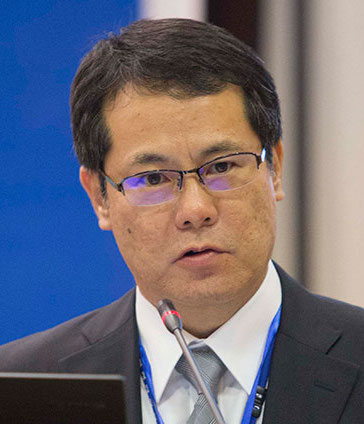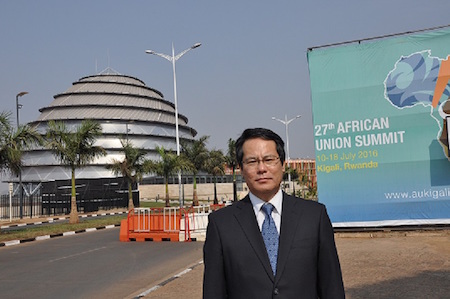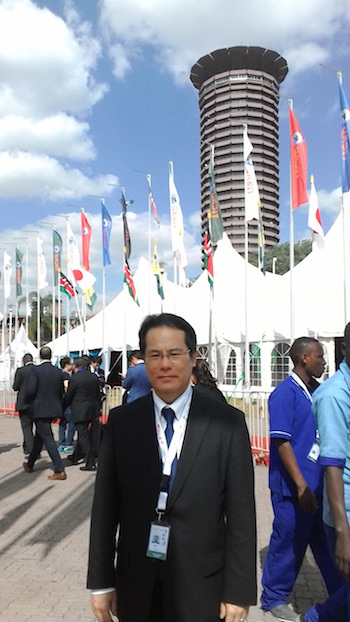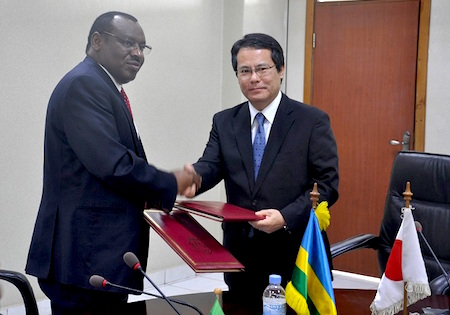 Hiroyuki Takada
Hiroyuki Takada
Chief Representative
JICA Rwanda Office
Public Policy Program (’97)
Please tell us about your career path so far. What is your area of specialization and how did you come to work in this area?
After graduating from university, I got involved in agricultural community development in Zambia as a Japan International Cooperation Agency (JICA) volunteer, and this led me to tying my hands in international cooperation and support for development in Africa. After returning from Zambia I enrolled at GSPS and worked to improve my specialist knowledge in international development. After finishing the first year, I took two years off from studying and joined a volunteer project in Indonesia with the Japan International Cooperation Agency, and my master’s thesis involved research on village development in Indonesia. When I graduated from GSPS I got a job at JICA and in the 20 years since then I have focused mainly on agriculture and agricultural community development and support for African development.
You are currently Chief Representative of the JICA Rwanda Office. What are your main roles and responsibilities?

In front of the Kigali International Conference Hall, the venue for the 27th African Union Summit, July 2016
In the four key fields of economic infrastructure, water and sanitation, agriculture, and education, JICA provides Rwanda with support including yen-concessional loans, grant aid, technical cooperation, training, volunteers, and private sector partnerships so I oversee all of these projects as well as the operation of the JICA Rwanda Office. As well as this I oversee projects in Burundi, which is next to Rwanda, and the operation of that office too.
In your current capacity, what do you see as the main challenges and opportunities for Rwanda over the course of the next five to ten years?
It’s been 23 years since the tragedy in which almost one million people, or a tenth of the population, were killed, and Rwanda is now using this tragedy as a lesson to call for a knowledge-based economy on the basis of national unity and political stability and is making efforts to develop human resources, which has resulted in steady economic growth. However, the fuel and goods, which are imported from the main ports in Mombasa in Kenya and Dar es Salaam in Tanzania, are unavoidably expensive, and I believe this is holding back further economic growth. The Rwandan government is expanding the number of RwandAir routes and flights, trying to attract hotels, and taking other measures in order to promote industries such as tourism and MICE (Meetings, Incentives, Conferences, and Exhibitions) that do not suffer the drawbacks of being a landlocked country. It is also using the fact that Rwanda is outstanding in terms of safety and other aspects compared to other African countries as a selling point, and development is expected to focus on the service sector, but I believe the challenges henceforth are to develop the human resources who will work in the sector and increase the quality of the services.
What are some of the biggest challenges you face in your work? And what have been the most interesting or rewarding aspects of your career thus far?

In front of the Tokyo International Conference of Africa’s Development (TICAD) venue in Nairobi, Kenya, August 2016.
The biggest challenge I’ve faced was in a yen-concessional loan project I was overseeing when I was working in the Turkey Office to build a railway that runs through a tunnel under the Bosphorus strait. I worked with parties such as the Turkish government and construction companies from Japan to take the project forward safely and without accidents to meet the deadline requested by the Turkish government, and when I came back from Turkey and saw the news of Prime Minister Abe and then Prime Minister Erdogan riding the first train in the opening ceremony for the railway, I was overcome with emotion.
Recently, I sometimes feel that the starting point of my career was my visit to the birthplace of Hideo Noguchi, the prominent Japanese bacteriologist who made many important contributions to our understanding of tropical diseases, particularly those affecting Africa, in the early 20th century, in my mother’s hometown of Inawashiro in Fukushima prefecture when I was young. 80 years have passed since Hideo Noguchi’s day, but I feel that Africa still needs support. When youngsters and volunteers of the Japan International Cooperation Agency show a strong desire to come back to Africa and continue their work, it makes me feel that the work of international cooperation is being passed down over generations, and this is what keeps me going.
What led you to GSPS/GRIPS? What was the most important thing you learned while here, and how has your experience at GRIPS prepared you for future endeavours?
When I was involved in agricultural community development in Zambia as a volunteer of the Japan International Cooperation Agency, I felt that in order to support development I needed broad ranging specialist knowledge not only of societal matters, but also including the international community, politics and economics, and other such areas. I also felt that as a Japanese person undertaking development support it was important to learn about Japan’s own experience of development.
To think of the development of society and countries, having learnt to look at development issues in a relative way with the time axis of history and the spatial axis of international relations in classes in a range of fields and with overseas students both on and off campus is useful for your career later on, I think.
What are some of your fondest memory of your time spent at GSPS/GRIPS?
My best memory of my time at GSPS is being able to deepen my relationship with overseas students from different countries while being at a graduate school in Japan, in situations like processing statistical and other data together with international students in the PC room until late at night and going on ski trips with them as an extracurricular activity.
What do you miss about Japan and how do you like living in Rwanda?

Signing an ODA loan agreement on road improvement with the Rwandan Finance Minister, July 2016
Since graduating I have been alternating between living in Japan and living overseas, so now I don’t miss Japan that much. What’s more, compared to when I first came to Africa as a member of the Japan International Cooperation Agency the Internet and other communications allow me to get information on Japan in real time, so other than feeling the time difference I don’t feel homesick about Japan. However, since Rwanda is landlocked it’s hard to get things like fresh seafood, so in some cases I do miss Japanese food.
I’ve come to Rwanda with my elementary school age kids together as a family, but it is a safe place so you can have peace of mind in your life here. You can’t buy everything cheaply here like you can in Japan, but the weather is pleasant all year round and you don’t need air conditioning so it’s a nice place to live.
How do you maintain a balance between your work and the rest of your life? And what is your favorite thing to do when you are not working?
Contrary to Japan, commuting time is short here so I have breakfast and dinner at home with my family and hearing about how things are at my kid’s school. On weekends I do sports and go shopping with my family. I place much importance on spending time with my family to ensure a good work life balance. Spending time with them is what I enjoy more than anything.
How would you like to maintain involved with the School? What do you expect from GRIPS as an alumnus and do you have any suggestions on how to further utilize the GRIPS alumni network?
I am in a position where I’m involved in development cooperation, so in the future I personally want to maintain and strengthen my relationship with GRIPS. Unfortunately, I have been unable to fully make use of the alumni network up to now. To enhance the network, I think follow up on graduates, information updates, and information sharing between graduates is essential. While this might be difficult for personal information protection reasons, I do think that former students must wonder what kind of work the people they studied with are doing now.





